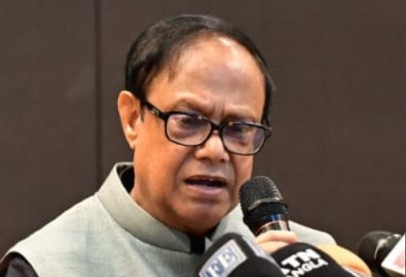Bangladesh Bank Governor Ahsan H Mansur has said that it will not be possible for the interim government to fully restore the country’s economy.
Speaking at a seminar in Dhaka on Wednesday, he said the current administration may be able to hand over a partially recovered economy to the next elected government, which is expected to carry forward the broader recovery process.
The seminar, titled “Financial Sector Development in Bangladesh”, was jointly organised by the Policy Research Institute (PRI), Bangladesh Bank, and the International Growth Centre (IGC), and held at a hotel in Gulshan.
The event brought together policymakers, economists, bankers, and industry leaders to discuss key challenges facing the country’s financial system amid mounting economic pressure.
In his keynote remarks as chief guest, Governor Mansur emphasised that without decentralisation of political power, achieving decentralised and inclusive economic development would be impossible.
He stressed that meaningful reform in this regard is ultimately dependent on the commitment of political parties.
The event was chaired by PRI Chairman Zaidi Sattar, and the keynote paper was presented by PRI Chief Economist Ashikur Rahman.
Ashikur Rahman’s presentation highlighted the growing concentration of wealth in the banking sector.
According to 2024 data, 42 percent of total bank deposits are held by just 0.1 percent of account holders—each with deposits of Tk 1 crore or more.
This trend, he noted, reflects a severe imbalance in wealth distribution, with a significant portion of the country’s financial assets concentrated in the hands of a small elite.
Governor Mansur also addressed the steep decline in foreign exchange reserves, which plummeted from a peak of $48 billion to just $20 billion in recent years.
He reported that approximately Tk 2.8 lakh crore had exited the domestic financial system—much of it likely held abroad—which in turn has stunted deposit growth and placed additional strain on the economy. He described rebuilding foreign reserves as one of the central bank’s highest priorities.
Currently, reserves have climbed back to $27 billion and are projected to reach $30 billion soon. The governor stressed that this recovery must be driven by a combination of increased remittance inflows, export earnings, and foreign financing.
In line with global financial trends, Governor Mansur reiterated Bangladesh’s ambition to transition towards a more inclusive, digital, and cashless economy.
He noted that around 20,000 agent banking outlets are already operational across the country, and this number is expected to exceed 26,000 in the near future.
Expanding and strengthening this network, he said, could bring transformational improvements in financial inclusion and significantly boost the microfinance sector.
The remarks come against a backdrop of persistent economic challenges for Bangladesh, including currency volatility, inflationary pressures, and a fragile balance of payments.
Analysts have frequently pointed out the need for structural reforms, improved governance, and financial decentralisation to ensure sustainable recovery and inclusive growth.
Other distinguished participants at the seminar included former National Board of Revenue Chairman Nasir Uddin Ahmed, Bangladesh Bank Executive Director Anisur Rahman, PRI Executive Director Khurshid Alam, and BNP Standing Committee Member Abdul Moyeen Khan.


